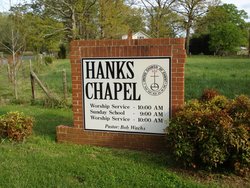 This is the message I preached on Sunday, February 24th, at Hanks Chapel United Church of Christ in Pittsboro, NC I hope it blesses you! If you find yourself in or near Pittsboro, please join us! Hanks Chapel has Sunday school at 9 AM, with worship beginning at 10 AM, and is located at 190 Hanks Chapel Loop, Pittsboro, NC. We also have Bible study most Wednesday nights at 6:30 PM at our fellowship hall.
This is the message I preached on Sunday, February 24th, at Hanks Chapel United Church of Christ in Pittsboro, NC I hope it blesses you! If you find yourself in or near Pittsboro, please join us! Hanks Chapel has Sunday school at 9 AM, with worship beginning at 10 AM, and is located at 190 Hanks Chapel Loop, Pittsboro, NC. We also have Bible study most Wednesday nights at 6:30 PM at our fellowship hall.
Call to Worship, based on poem by Lillian Susan Thomas
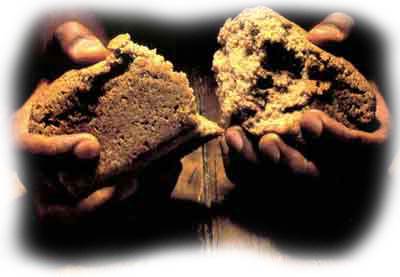 Loaf
Loaf
of bread
makes
a song
of fragrance,
waiting
to
feed all
who hunger.
If only it
worked that way,
the world
could
be full
and hope would
waft on
winds
with bread
scent.
Sermon “Enough is as Good as a Feast”
Matthew 14:13-33 New International Version (NIV)
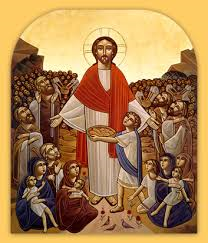 13 When Jesus heard what had happened, he withdrew by boat privately to a solitary place. Hearing of this, the crowds followed him on foot from the towns. 14 When Jesus landed and saw a large crowd, he had compassion on them and healed their sick.
13 When Jesus heard what had happened, he withdrew by boat privately to a solitary place. Hearing of this, the crowds followed him on foot from the towns. 14 When Jesus landed and saw a large crowd, he had compassion on them and healed their sick.
15 As evening approached, the disciples came to him and said, “This is a remote place, and it’s already getting late. Send the crowds away, so they can go to the villages and buy themselves some food.”
16 Jesus replied, “They do not need to go away. You give them something to eat.”
17 “We have here only five loaves of bread and two fish,” they answered.
18 “Bring them here to me,” he said. 19 And he directed the people to sit down on the grass. Taking the five loaves and the two fish and looking up to heaven, he gave thanks and broke the loaves. Then he gave them to the disciples, and the disciples gave them to the people. 20 They all ate and were satisfied, and the disciples picked up twelve basketfuls of broken pieces that were left over. 21 The number of those who ate was about five thousand men, besides women and children.
22 Immediately Jesus made the disciples get into the boat and go on ahead of him to the other side, while he dismissed the crowd. 23 After he had dismissed them, he went up on a mountainside by himself to pray. Later that night, he was there alone, 24 and the boat was already a considerable distance from land, buffeted by the waves because the wind was against it.
25 Shortly before dawn Jesus went out to them, walking on the lake. 26 When the disciples saw him walking on the lake, they were terrified. “It’s a ghost,” they said, and cried out in fear.
27 But Jesus immediately said to them: “Take courage! It is I. Don’t be afraid.”
28 “Lord, if it’s you,” Peter replied, “tell me to come to you on the water.”
29 “Come,” he said.
Then Peter got down out of the boat, walked on the water and came toward Jesus. 30 But when he saw the wind, he was afraid and, beginning to sink, cried out, “Lord, save me!”
31 Immediately Jesus reached out his hand and caught him. “You of little faith,” he said, “why did you doubt?”
32 And when they climbed into the boat, the wind died down. 33 Then those who were in the boat worshiped him, saying, “Truly you are the Son of God.”
These are the words of God for the people of God. May we hear God’s voice as we listen to them, discuss them, and embrace them in Christ’s name. Amen.
What stands out to you about these words of Scripture?
As I read these words, my memory goes back to a freezer and fridge overflowing with food.
Before my late wife passed, I don’t believe I had ever seen so much food in my life. Day 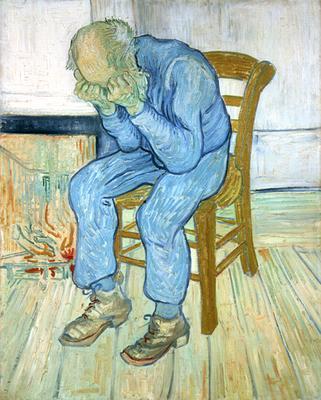 after day after her passing, everyone brought by tupperwares of every imaginable food. In fact, when I moved to Durham a year and a half later, I do believe I still had tupperwares in my fridge left over from kind people who came by my apartment the first few weeks after Kat passed, worried I might be so overcome by grief I didn’t think to cook. Being raised by folks who taught me “waste not, want not,” cooking again for myself felt like a reward, since I made myself wait until I got some distance into the freezer, reheating meal upon meal until I began to cook for myself again.
after day after her passing, everyone brought by tupperwares of every imaginable food. In fact, when I moved to Durham a year and a half later, I do believe I still had tupperwares in my fridge left over from kind people who came by my apartment the first few weeks after Kat passed, worried I might be so overcome by grief I didn’t think to cook. Being raised by folks who taught me “waste not, want not,” cooking again for myself felt like a reward, since I made myself wait until I got some distance into the freezer, reheating meal upon meal until I began to cook for myself again.
Not only was I surrounded by food – but by lots of other kind gestures, like how my Sunday school class pitched in money and bought me a tree for Christmas, knowing how special decorating at the holidays had been for me. And one friend came over and insisted to clean and reorganize my kitchen, while bringing over a big container of pasta that lasted for weeks.
This was how my community cared for me in a time of grief and trauma.
When we join Jesus and his first followers in our Gospel lesson, they too are in a time of grief and trauma. Jesus’ mentor, John the Baptizer, who had organized a movement of repentance and renewal centered on baptism, the very same baptism Jesus went through earlier in Matthew, had been beheaded by the puppet ruler of Palestine, Herod. John had called Herod out for his violence, for his license when it came to women, for the way he used and abused others. Then, in the midst of a lavish party in Herod’s palace, with more food and drink than one could know what to do with, Herod’s niece had done a dance for him and, on behalf of her mother, the wife of Herod’s brother, a woman who Herod had taken as his own lover, she asked for John’s head on a platter.
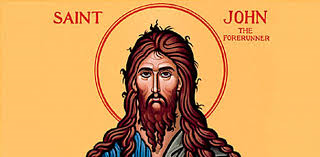 As we begin today’s reading, John’s head has just been delivered on that platter as promised. John the Baptizer’s outcry against the sins of the comfortable, powerful, and well-established was finally silenced by the power of Roman state violence.
As we begin today’s reading, John’s head has just been delivered on that platter as promised. John the Baptizer’s outcry against the sins of the comfortable, powerful, and well-established was finally silenced by the power of Roman state violence.
I can only imagine the shock and pain Jesus must have felt and the questions that must have run through his mind on hearing the news of John’s death. I can only imagine how heartbroken, confused, and lost those who had gone down with Jesus to the river Jordan to be baptized by John, must have felt to see him killed so brutally.
As individuals, as communities, as families, as a church, as a nation, we go through times of trauma and shock too, times which shake us to the core, leave us hurting and grieving, leaving us wondering what comes next and where to turn. What does Jesus’ example teach us about how to deal with loss, grief, and trauma?
First, Jesus models our need in the midst of such pain to take a time out, to stop and to simply be. Jesus knows his disciples are hurting and looking for comfort from him. He knows those who have looked first to John the Baptizer and then also to him for a word from God will be looking to him, hoping he will show them some way forward. Yet he puts a pause on his need to rush to respond.
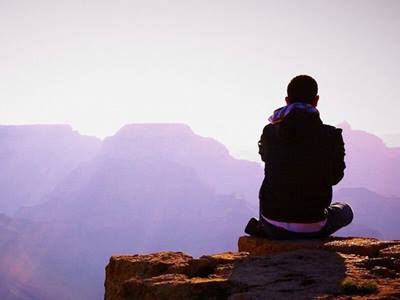 It is easy, in the midst of your own pain, to simply react. To rush to decisions. To rush to new plans. Jesus could have done this. But he knew he needed to stop, to sit with what had happened, seeing what lessons it had to teach. He knew his need, as Hebrews 4 invites us, to come boldly before God’s throne of grace where he can find mercy and strength in this time of need.
It is easy, in the midst of your own pain, to simply react. To rush to decisions. To rush to new plans. Jesus could have done this. But he knew he needed to stop, to sit with what had happened, seeing what lessons it had to teach. He knew his need, as Hebrews 4 invites us, to come boldly before God’s throne of grace where he can find mercy and strength in this time of need.
Before he could help others who were hurting, he knew he had to reach out to the One who heals hurting hearts. Before he could share a word from God with others, even Jesus had to step away from the noise of what had happened, quiet his own heart, go to God, and listen. So Jesus begins by leaving the crowd and going away alone, just Him and God. Likewise, after he ministers to the crowd, he sends his disciples away by themselves so they can do the same; and he then pulls away from both to again pour himself into prayer, plugging into the presence and life of God.
Lord willing and the creek don’t rise, in a few weeks I am flying on an airplane to visit my longtime friend a UCC minister up in Boston. Likely I will experience what most of 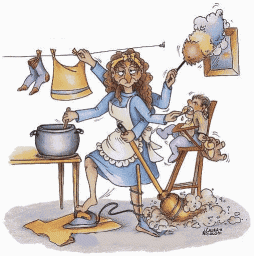 us do whenever you ride in a plane. Before takeoff usually they do a safety talk where they point out exits, explain seatbelts, and explain what to do if air pressure goes wonky. They always explain oxygen masks will fall down, and then tell you that, though you might be tempted to rush to put masks on the person beside you first, to secure your own mask first, because only then can you really help another with their own. What good would it be for both of you to pass out, breathless, while you are trying to help each other? Jesus models here the need for all of us to put on our own masks first, making sure we are giving ourselves the breathing room to spiritually reconnect with God, when we come out of loss and trial, or face crises of our own.
us do whenever you ride in a plane. Before takeoff usually they do a safety talk where they point out exits, explain seatbelts, and explain what to do if air pressure goes wonky. They always explain oxygen masks will fall down, and then tell you that, though you might be tempted to rush to put masks on the person beside you first, to secure your own mask first, because only then can you really help another with their own. What good would it be for both of you to pass out, breathless, while you are trying to help each other? Jesus models here the need for all of us to put on our own masks first, making sure we are giving ourselves the breathing room to spiritually reconnect with God, when we come out of loss and trial, or face crises of our own.
Next, Jesus models our need to let the tragedy or trauma we’ve faced from a situation open us up to welcome in other hurting people and share with them, rather than closing ourselves behind walls out of fear.
In large part because of the people who surrounded me with not just tupperwares of food but also companionship, listening ears, and love, I was able to take my own pain from being widowed and let it teach me how to have compassion on people losing loved ones during my work with hospice. Rather than breaking me in two, the experience broke me open to love and serve others in new ways.
Yet, like many of you, I have seen people broken by their pain in such ways that they become jaded, afraid to open to others, busily protecting themselves from ever getting hurt again.
In a way that response of fear seems to be the one the disciples have when they are over-run by those hurting people who cannot figure out how to move on after John’s death, who come and crash Jesus’ retreat to be alone and pray. The disciples see them and are worried they will run out: there is not only not enough food, but not enough energy, time, room, or resources, for such a crowd that have crossed the borders they felt Jesus’ retreat had marked off. Send them away, the disciples say. We have to protect our own food, time, space, energy. If we share, there will not be enough, they think.
And to be sure, resources are limited, from a human standpoint. This story centers on  fish and water – the disciples go out on a fishing boat on the Sea of Galilee and people share fish that had been pulled out of the waters of that same Sea. The reason people flock to the Sea of Galilee to fish there, was that food in general was scarce. Most ordinary working people in Palestine had been pushed off the farm lands where their ancestors raised crops for food by Roman leaders like Herod and wealthy aristocrats like the temple priests, both of whom John had called out to repent for how they had built great wealth by gobbling up those lands and generally mistreating the poor. Now many people had no land on which to farm. If they still lived on the lands their ancestors farmed, they weren’t able to keep the food they grew but had to hand it over to these wealthy folks who now owned that land and sold its crops for a profit. So food was hard to come by – and people had to fish the waters of Galilee just to get enough to eat. Add to this the real threat that John’s death brought — that the might of Rome might come for the lives John’s followers too – and you can see why the disciples might want to put walls up, to hoard what little freedom, food, energy, and resources they had just for themselves, and most of all not let in crowds of people who drew attention from Herod and his government.
fish and water – the disciples go out on a fishing boat on the Sea of Galilee and people share fish that had been pulled out of the waters of that same Sea. The reason people flock to the Sea of Galilee to fish there, was that food in general was scarce. Most ordinary working people in Palestine had been pushed off the farm lands where their ancestors raised crops for food by Roman leaders like Herod and wealthy aristocrats like the temple priests, both of whom John had called out to repent for how they had built great wealth by gobbling up those lands and generally mistreating the poor. Now many people had no land on which to farm. If they still lived on the lands their ancestors farmed, they weren’t able to keep the food they grew but had to hand it over to these wealthy folks who now owned that land and sold its crops for a profit. So food was hard to come by – and people had to fish the waters of Galilee just to get enough to eat. Add to this the real threat that John’s death brought — that the might of Rome might come for the lives John’s followers too – and you can see why the disciples might want to put walls up, to hoard what little freedom, food, energy, and resources they had just for themselves, and most of all not let in crowds of people who drew attention from Herod and his government.
It is easy to let pain become fear, distrust of others. For it to lead us to put up walls to keep out others who are hurting, who are different. To lead us to turn inward. Ultimately that just creates a situation where we hurt more, are lonely and isolated, and we multiply that hurt in the lives of others around us by pushing away from them when they need us most.
You can see how this can happen in our personal lives, and in families, but we see this tendency writ large in communities across our country right now, whether churches or towns; and across the country as a whole. People are feeling threatened and afraid by  changes in our society, by people who are different, by the economic struggles they are going through, and so not only put up metaphoric walls but are arguing to put up literal walls, afraid of the stranger, the immigrant, the poor, the struggling and in need. That fear can lead us to think there is not enough to go around, and we must hoard what little we have from others.
changes in our society, by people who are different, by the economic struggles they are going through, and so not only put up metaphoric walls but are arguing to put up literal walls, afraid of the stranger, the immigrant, the poor, the struggling and in need. That fear can lead us to think there is not enough to go around, and we must hoard what little we have from others.
Jesus chooses another path. When the crowd comes seeking words of comfort and direction, he welcomes them. He is moved with compassion for them, his heart breaking at their situation. The Biblical Greek used to describe what we translate “heal the sick” here literally means strengthen the weak. Jesus shares his time, his energy, his prayers, his attention and what good words he has for them, to strengthen them in this time of weakness. And, rather than sending them back to fend for themselves, he instructs the disciples to take what little food they have – just a bit of bread and fish, and let him bless it, and then have them distribute it to the crowd.
When he does so, everyone is fed and comforted by eating together. And much more bread and food is gathered than is ever passed out. The Bible does not explain how this happens. Was it like when Elijah went to the widow in his journeys and blessed her oil container, so so it never ran out, all based on God’s generous provision despite every law of nature , because she was generous and gave more than she thought she could afford to him, choosing generosity rather than fear? Or was it that everyone there had a bit of  food with them already— some only a tiny bit and some a lot more than they could ever use— which they were all keeping to themselves out of fear, yet when those people saw the disciples sharing what little they had it inspired them, the whole crowd, to each chip in a bit? Either way, we are reminded that if we embrace the idea that we don’t need extravagance, but enough is as good as a feast, and that if, rather than seeking extravagance, we share with others, we will be amazed at the ripple effect it makes, leading others to pay it forward in ways that are truly miraculous! As I’ve said before, Jesus models that God’s way is not about building higher walls to keep others out but wider tables, where more can be welcomed.
food with them already— some only a tiny bit and some a lot more than they could ever use— which they were all keeping to themselves out of fear, yet when those people saw the disciples sharing what little they had it inspired them, the whole crowd, to each chip in a bit? Either way, we are reminded that if we embrace the idea that we don’t need extravagance, but enough is as good as a feast, and that if, rather than seeking extravagance, we share with others, we will be amazed at the ripple effect it makes, leading others to pay it forward in ways that are truly miraculous! As I’ve said before, Jesus models that God’s way is not about building higher walls to keep others out but wider tables, where more can be welcomed.
Which leads us to the final message of this text. Which is how this is all possible. You see ,this call out of fear into openness and faith is frightening. Like the disciples at the end of our reading, we can feel that we are on shaky, uncertain ground. It can feel like we are about to be knocked over by waves, drowned. It can feel like being called onto choppy seas, called to walk on the water like Peter is called by Jesus.
In a way, it is. It is a call beyond who we can be and what we can do on our own. It is only possible because we follow one who can walk on the water, one whom the wind and wave obey – Jesus the Christ.
This would have been very clear to those who first read the Gospel of Matthew. The Gospels were all written as one of the last parts of the Bible. While the eyewitnesses to Jesus’ life lived, people simply went to them to hear the stories of Jesus. These all seem to have been written in responses to persecutions in which Christians died, as a way of keeping the story of Jesus around.
In particular, the Gospels began to be written after the persecutions of emperors Domitian and Nero, under whose reigns the apostles John the Revelator and Paul both ![]() were killed. Nero in particular was known for throwing parties like the party Herod threw – full of piles upon piles of food, and pitchers upon pitchers of wine, all while the people of the empire starved. And, like Herod killed John the Baptizer as a part of his festivities, Nero was known for stringing up Christians and lighting them afire like Tiki torches to keep his parties well lit at night.
were killed. Nero in particular was known for throwing parties like the party Herod threw – full of piles upon piles of food, and pitchers upon pitchers of wine, all while the people of the empire starved. And, like Herod killed John the Baptizer as a part of his festivities, Nero was known for stringing up Christians and lighting them afire like Tiki torches to keep his parties well lit at night.
If ever there was a time for fear, it was in that time period when this persecution went on, which is the time period around which the Gospels were written. And yet, history tells us it was the great generosity in the giving of food and clothes, the care for the sick and abandoned, service to others, and other acts of people whose hearts were moved with compassion, offered by these first Christians in the midst of such persecutions that led the poor, suffering, and outcast to flock to the church. Those followers of Jesus chose to let their experience of suffering and loss, trauma and threat, not cause them to withdraw from the world and set up walls to exclude others who were different but instead to be moved with compassion for the world around them, and openly share with and serve others. Historians tells us it is this choice made by those persecuted Christians which ultimately caused the church to grow and thrive.
 They could do this because they knew it was not up to them. They depended on the one who can make the most tempestuous storms and waves as still as pavement, as sturdy as the mountains, and easier to walk on than a sidewalk with just a Word. And in that one they could trust and rest secure.
They could do this because they knew it was not up to them. They depended on the one who can make the most tempestuous storms and waves as still as pavement, as sturdy as the mountains, and easier to walk on than a sidewalk with just a Word. And in that one they could trust and rest secure.
And the same is true for you, and is true for me.
May we choose to trust, to follow Christ onto the waters, by living lives of faith rather than fear, compassion rather than closed mindedness, sharing and service rather than shrinking behind walls. Amen and Amen.

 I remember experiencing Calvary Methodist in Durham, then pastored by Rev.
I remember experiencing Calvary Methodist in Durham, then pastored by Rev. 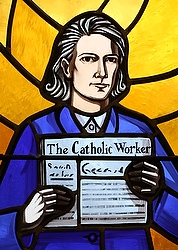
 24 Jesus told them another parable: “The kingdom of heaven is like a man who sowed good seed in his field. 25 But while everyone was sleeping, his enemy came and sowed weeds among the wheat, and went away. 26 When the wheat sprouted and formed heads, then the weeds also appeared.
24 Jesus told them another parable: “The kingdom of heaven is like a man who sowed good seed in his field. 25 But while everyone was sleeping, his enemy came and sowed weeds among the wheat, and went away. 26 When the wheat sprouted and formed heads, then the weeds also appeared.
 us to be caring for all kinds of people, even enemy and outcast, even those who use and mistreat us, even when that means forgiving them, going the extra mile for them, turning the other cheek, or sharing with others without expectation of “thank you” or a return of the favor — all of this is a picture Jesus has been painting of what God’s love looks like when it is put into action. Speaking of the importance of such love in our life, Rev. Dr. Martin Luther King once said “Power without love is reckless and abusive, and love without power is sentimental and anemic. Power at its best is love implementing the demands of justice, and justice at its best is power correcting everything that stands against love.” Cornel West picked up where King left off by adding, “We have to recognise that there cannot be relationships unless there is commitment, unless there is loyalty, unless there is love, patience, persistence…” — the very things Jesus calls us to in his Sermon on the Mount! And Dr. West continues, “Never forget that justice is what love looks like in public.”
us to be caring for all kinds of people, even enemy and outcast, even those who use and mistreat us, even when that means forgiving them, going the extra mile for them, turning the other cheek, or sharing with others without expectation of “thank you” or a return of the favor — all of this is a picture Jesus has been painting of what God’s love looks like when it is put into action. Speaking of the importance of such love in our life, Rev. Dr. Martin Luther King once said “Power without love is reckless and abusive, and love without power is sentimental and anemic. Power at its best is love implementing the demands of justice, and justice at its best is power correcting everything that stands against love.” Cornel West picked up where King left off by adding, “We have to recognise that there cannot be relationships unless there is commitment, unless there is loyalty, unless there is love, patience, persistence…” — the very things Jesus calls us to in his Sermon on the Mount! And Dr. West continues, “Never forget that justice is what love looks like in public.” of love breaks forth here and now. He doesn’t quote the experts either, the philosophers or theologians. In his parables Jesus points to everyday life – he talks about women baking bread, he talks about planting seeds, growing plants, and farming. Though for some of us, such things may seem far removed from our daily lives, working at universities, doctor’s offices, nursing homes, construction sites, this likely is not the case for all of us here. And it couldn’t have been less true for his first audience. For them the stories Jesus gives are of what they did every single day.
of love breaks forth here and now. He doesn’t quote the experts either, the philosophers or theologians. In his parables Jesus points to everyday life – he talks about women baking bread, he talks about planting seeds, growing plants, and farming. Though for some of us, such things may seem far removed from our daily lives, working at universities, doctor’s offices, nursing homes, construction sites, this likely is not the case for all of us here. And it couldn’t have been less true for his first audience. For them the stories Jesus gives are of what they did every single day. Yet each is messy. They discover weeds are growing alongside the wheat and have to decide whether to risk pulling up wheat alongside weeds by weeding before harvest time, or to risk weeds choking out some of the wheat’s resources in the meantime, possibly damaging the harvest. The yeast the woman does not just mix into but, in the original Greek literally hides within, the dough is not the sweet sanitized packets you buy in a store, but a smelly bubbly mix of old dough that has developed all kinds of bacteria and, though effective for its purpose, would seem very gross to us. And mustard plants kind of got mixed reviews – some people used them for food, but others treated them like pernicious weeds that weren’t good for much. So, messy business indeed!
Yet each is messy. They discover weeds are growing alongside the wheat and have to decide whether to risk pulling up wheat alongside weeds by weeding before harvest time, or to risk weeds choking out some of the wheat’s resources in the meantime, possibly damaging the harvest. The yeast the woman does not just mix into but, in the original Greek literally hides within, the dough is not the sweet sanitized packets you buy in a store, but a smelly bubbly mix of old dough that has developed all kinds of bacteria and, though effective for its purpose, would seem very gross to us. And mustard plants kind of got mixed reviews – some people used them for food, but others treated them like pernicious weeds that weren’t good for much. So, messy business indeed! world, making it more like it is in heaven, and making love happen in community or in public, we need patience and understanding. If we open ourselves to others — whether friend or partner, family member or church member, neighbor or someone we are called to serve, even the best relationships with them will be messy and take time. And sometimes God calls us to love, serve, and care for people we don’t naturally find easy, with that commitment to love being how the kingdom breaks out in our midst. Although God could choose to just snap God’s fingers and make it all work out at once, God doesn’t. Love takes time, even God’s love. God works slowly, over time. God spreads changes little by little, person by person, in this love lived in public, love lived in community.
world, making it more like it is in heaven, and making love happen in community or in public, we need patience and understanding. If we open ourselves to others — whether friend or partner, family member or church member, neighbor or someone we are called to serve, even the best relationships with them will be messy and take time. And sometimes God calls us to love, serve, and care for people we don’t naturally find easy, with that commitment to love being how the kingdom breaks out in our midst. Although God could choose to just snap God’s fingers and make it all work out at once, God doesn’t. Love takes time, even God’s love. God works slowly, over time. God spreads changes little by little, person by person, in this love lived in public, love lived in community.
 “Do not judge, or you too will be judged. 2 For in the same way you judge others, you will be judged, and with the measure you use, it will be measured to you.
“Do not judge, or you too will be judged. 2 For in the same way you judge others, you will be judged, and with the measure you use, it will be measured to you. One of the most life- and trouble-saving inventions in my life was the GPS. Before I got one in my car, and then later now in my phone, I took missing my turn and getting lost on a trip to epic proportions.
One of the most life- and trouble-saving inventions in my life was the GPS. Before I got one in my car, and then later now in my phone, I took missing my turn and getting lost on a trip to epic proportions. pressure? Have you checked the oil? Have checked and double checked the maps? I guess deep down he knew I was one apt to make a wrong turn and end up stranded in the desert.
pressure? Have you checked the oil? Have checked and double checked the maps? I guess deep down he knew I was one apt to make a wrong turn and end up stranded in the desert. pearls before swine, but in truth he is warning us, that the path we are on is one it is easy to become distracted from, and thus from which to wander off. Jesus’ warning echoes the challenge of the prophet Isaiah who asked those who heard him in his day, “Why spend money on what is not bread, and your labor on what does not satisfy? “ The world bombards us with the messages to give our time, talent, and treasure, our hearts and lives into things that truly don’t fulfill, into projects that will not give us the return they promise on our investment, into people and relationships that won’t last. And we find ourselves forgetting the higher calling, losing our way, and wandering off in the desert like the one I got Kat, my friend John, and me lost in so many years ago, as we follow rabbit trails off the beaten path Christ is laying out for us.
pearls before swine, but in truth he is warning us, that the path we are on is one it is easy to become distracted from, and thus from which to wander off. Jesus’ warning echoes the challenge of the prophet Isaiah who asked those who heard him in his day, “Why spend money on what is not bread, and your labor on what does not satisfy? “ The world bombards us with the messages to give our time, talent, and treasure, our hearts and lives into things that truly don’t fulfill, into projects that will not give us the return they promise on our investment, into people and relationships that won’t last. And we find ourselves forgetting the higher calling, losing our way, and wandering off in the desert like the one I got Kat, my friend John, and me lost in so many years ago, as we follow rabbit trails off the beaten path Christ is laying out for us.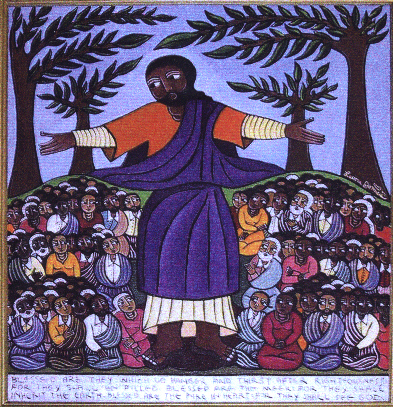 Matthew 6:7-21, New International Version
Matthew 6:7-21, New International Version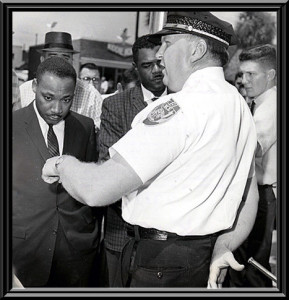 This Scripture reminds me of a story by my good friend Chuck. Chuck Fager often tells people of his experience eating Rev. Dr. Martin Luther King’s dinner. Chuck is retired and lives in Durham now, but when he was younger was a student worker helping with Dr. King’s fight for Civil Rights in Selma. Chuck tells how, he was gathered up by the police with Dr. King and others while they were speaking up against segregation. Chuck had only been there a month and had no idea what to expect. He ended up being tossed in a jail cell together with Martin Luther King and some of those other key leaders in the civil rights movement there.
This Scripture reminds me of a story by my good friend Chuck. Chuck Fager often tells people of his experience eating Rev. Dr. Martin Luther King’s dinner. Chuck is retired and lives in Durham now, but when he was younger was a student worker helping with Dr. King’s fight for Civil Rights in Selma. Chuck tells how, he was gathered up by the police with Dr. King and others while they were speaking up against segregation. Chuck had only been there a month and had no idea what to expect. He ended up being tossed in a jail cell together with Martin Luther King and some of those other key leaders in the civil rights movement there.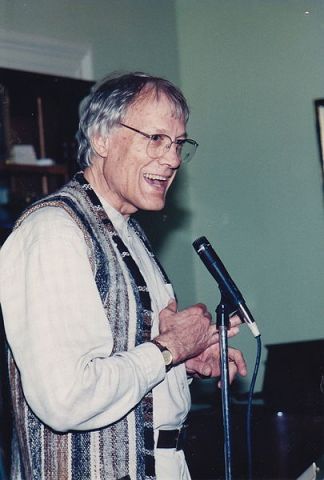 their work for civil rights and equality for all was, something more was needed. They need to be able to also to put away the business, stress, and constant going, going, going, that this work brought into their lives at times and simply to be in the presence of God. As Walter Wink says in his book Prayer and the Powers, “Unprotected by prayer, our social activism runs the danger of becoming self-justifying good works, as our inner resources atrophy, the wells of love run dry, and we are slowly changed into the likeness of” what we fight against; “prayer…is the field hospital in which the diseased spirituality that we have contracted from” the injustice all around us “can most directly be diagnosed and treated.”
their work for civil rights and equality for all was, something more was needed. They need to be able to also to put away the business, stress, and constant going, going, going, that this work brought into their lives at times and simply to be in the presence of God. As Walter Wink says in his book Prayer and the Powers, “Unprotected by prayer, our social activism runs the danger of becoming self-justifying good works, as our inner resources atrophy, the wells of love run dry, and we are slowly changed into the likeness of” what we fight against; “prayer…is the field hospital in which the diseased spirituality that we have contracted from” the injustice all around us “can most directly be diagnosed and treated.” knew he needed to drink deep of the waters of life God offers to sustain himself and keep his perspective. This is something I have to constantly remind myself as someone who works with ministry: ultimately though that work is important, it cannot become an end in itself. If I am not myself connecting with God each day, working at caring for and loving the people around me, and working to be the person God has called me to be, even so-called “holy work” can be a kind of keeping up appearances.
knew he needed to drink deep of the waters of life God offers to sustain himself and keep his perspective. This is something I have to constantly remind myself as someone who works with ministry: ultimately though that work is important, it cannot become an end in itself. If I am not myself connecting with God each day, working at caring for and loving the people around me, and working to be the person God has called me to be, even so-called “holy work” can be a kind of keeping up appearances. the rim, I can reach one spoke after the other, but when I stay at the hub, I am in touch with all the spokes at once. To pray is to move to the center of all life and all love. The closer I come to the hub of life, the closer I come to all that receives its strength and energy from there. My tendency is to get so distracted by the diversity of the many spokes of life, that I am busy but not truly life-giving, all over the place but not focused. By directing my attention to the heart of life, I am connected with its rich variety while remaining centered. What does the hub represent? I think of it as my own heart, the heart of God, and the heart of the world. When I pray, I enter into the depth of my own heart and find there the heart of God, who speaks to me of love. And I recognize, right there, the place where all of my sisters and brothers are in communion with one another. The great paradox of the spiritual life is, indeed, that the most personal is most universal, that the most intimate, is most communal, and that the most contemplative is most active. The wagon wheel shows that the hub is the center of all energy and movement, even when it often seems not to be moving at all. In God all action and all rest are one. So too prayer!”
the rim, I can reach one spoke after the other, but when I stay at the hub, I am in touch with all the spokes at once. To pray is to move to the center of all life and all love. The closer I come to the hub of life, the closer I come to all that receives its strength and energy from there. My tendency is to get so distracted by the diversity of the many spokes of life, that I am busy but not truly life-giving, all over the place but not focused. By directing my attention to the heart of life, I am connected with its rich variety while remaining centered. What does the hub represent? I think of it as my own heart, the heart of God, and the heart of the world. When I pray, I enter into the depth of my own heart and find there the heart of God, who speaks to me of love. And I recognize, right there, the place where all of my sisters and brothers are in communion with one another. The great paradox of the spiritual life is, indeed, that the most personal is most universal, that the most intimate, is most communal, and that the most contemplative is most active. The wagon wheel shows that the hub is the center of all energy and movement, even when it often seems not to be moving at all. In God all action and all rest are one. So too prayer!”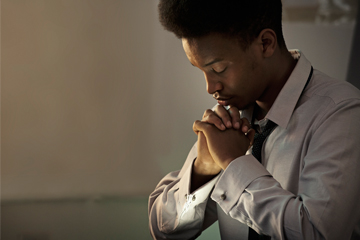 become our own. We are inviting God to widen our vision so that we can see ourselves and others as God does. When we pray your kingdom come, your will be done, we are signing our names on the dotted line and agreeing to be partners with God in God’s work of setting right our world. When you pray for God to give us our daily bread, you pray not just saying “give me my bread” but “give us”, recognizing that the needs of each person matter, and you are intended to be a part of God’s answer to this prayer for daily bread for others. And Jesus makes it clear in his words after he introduces this prayer that praying for God to forgive your debts challenges you to forgive others who have wronged and harmed you. The language Jesus uses is peculiar too – he does not say forgive us our sins or harms, but forgive us our debt. In his day and age, like ours, debts could wreck a person’s life. Praying this prayer also involves an obligation to help accept God’s clearing of the slate while also committing to help clear the slate for others. This does include forgiving people and seeking reconciliation. But such prayer should also challenge us to ask, Do we set up a system in our society where people are pushed into debts like ones falling into the bottom of a well, without a way up, when they face health problems, disasters, poor choices early in life? Does our world throw those people, whoever that is, into cycles of poverty or into the criminal justice system without a way to right their wrongs?
become our own. We are inviting God to widen our vision so that we can see ourselves and others as God does. When we pray your kingdom come, your will be done, we are signing our names on the dotted line and agreeing to be partners with God in God’s work of setting right our world. When you pray for God to give us our daily bread, you pray not just saying “give me my bread” but “give us”, recognizing that the needs of each person matter, and you are intended to be a part of God’s answer to this prayer for daily bread for others. And Jesus makes it clear in his words after he introduces this prayer that praying for God to forgive your debts challenges you to forgive others who have wronged and harmed you. The language Jesus uses is peculiar too – he does not say forgive us our sins or harms, but forgive us our debt. In his day and age, like ours, debts could wreck a person’s life. Praying this prayer also involves an obligation to help accept God’s clearing of the slate while also committing to help clear the slate for others. This does include forgiving people and seeking reconciliation. But such prayer should also challenge us to ask, Do we set up a system in our society where people are pushed into debts like ones falling into the bottom of a well, without a way up, when they face health problems, disasters, poor choices early in life? Does our world throw those people, whoever that is, into cycles of poverty or into the criminal justice system without a way to right their wrongs? may go without food or comfort not by choice. As Isaiah 58 challenges us, “Is not this the kind of fasting I have chosen: to loose the chains of injustice and untie the cords of the yoke, to set the oppressed free and break every yoke? Is it not to share your food with the hungry and to provide the poor wanderer with shelter— when you see the naked, to clothe them, and not to turn away from your own flesh and blood? … [to] spend yourselves in behalf of the hungry and satisfy the needs of the oppressed…” This why such fasting as follows after the footsteps of Jesus cannot be for show. Its point is not to make you feel or seem big and important. It is to challenge you to see yourself and others as God does, and be moved to respond to them at their point of need.
may go without food or comfort not by choice. As Isaiah 58 challenges us, “Is not this the kind of fasting I have chosen: to loose the chains of injustice and untie the cords of the yoke, to set the oppressed free and break every yoke? Is it not to share your food with the hungry and to provide the poor wanderer with shelter— when you see the naked, to clothe them, and not to turn away from your own flesh and blood? … [to] spend yourselves in behalf of the hungry and satisfy the needs of the oppressed…” This why such fasting as follows after the footsteps of Jesus cannot be for show. Its point is not to make you feel or seem big and important. It is to challenge you to see yourself and others as God does, and be moved to respond to them at their point of need.